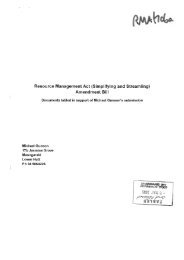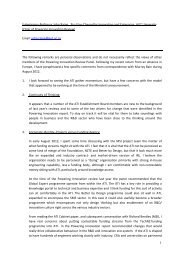Ng¯ati Tuwharetoa (Bay of Plenty) Claims Settlement Bill
Ng¯ati Tuwharetoa (Bay of Plenty) Claims Settlement Bill
Ng¯ati Tuwharetoa (Bay of Plenty) Claims Settlement Bill
You also want an ePaper? Increase the reach of your titles
YUMPU automatically turns print PDFs into web optimized ePapers that Google loves.
Part 1 cl 8<br />
Ngāti <strong>Tuwharetoa</strong> (<strong>Bay</strong> <strong>of</strong> <strong>Plenty</strong>)<br />
<strong>Claims</strong> <strong>Settlement</strong><br />
resources and wāhi tapu, and contributed significantly<br />
to the subsequent dislocation and fragmentation <strong>of</strong> the<br />
iwi; and<br />
(c) its confiscation <strong>of</strong> Ngāti <strong>Tuwharetoa</strong> (<strong>Bay</strong> <strong>of</strong> <strong>Plenty</strong>)<br />
lands was unjust and a breach <strong>of</strong> the Treaty <strong>of</strong> Waitangi<br />
(Te Tiriti o Waitangi) and its principles.<br />
(3) The Crown acknowledges that:<br />
(a) the prejudice created by the confiscation was compounded<br />
by inadequacies in the Compensation Court<br />
process; and<br />
(b) the confiscations were indiscriminate in that the Crown<br />
failed to return land in full to those it did not consider to<br />
have been involved in the actions that prompted the<br />
confiscation; and<br />
(c) some Ngāti <strong>Tuwharetoa</strong> (<strong>Bay</strong> <strong>of</strong> <strong>Plenty</strong>) land was<br />
awarded to other iwi. As a result some Ngāti<br />
<strong>Tuwharetoa</strong> (<strong>Bay</strong> <strong>of</strong> <strong>Plenty</strong>) tangata were dislocated<br />
from the lands they traditionally occupied and cultivated;<br />
and<br />
(d) Ngāti <strong>Tuwharetoa</strong>(’s) (<strong>Bay</strong> <strong>of</strong> <strong>Plenty</strong>) traditional tribal<br />
estate was further reduced by transfer under the native<br />
land laws, including Crown purchases; and<br />
(e) the Compensation Court and the Native Land Court<br />
awarded land to individuals rather than iwi or hapū.<br />
This was not consistent with customary tenure and<br />
made those lands more susceptible to partition and<br />
alienation; and<br />
(f) these actions eroded the traditional social structures,<br />
mana, and rangatiratanga <strong>of</strong> Ngāti <strong>Tuwharetoa</strong> (<strong>Bay</strong> <strong>of</strong><br />
<strong>Plenty</strong>). The Crown failed to adequately protect Ngāti<br />
<strong>Tuwharetoa</strong> (<strong>Bay</strong> <strong>of</strong> <strong>Plenty</strong>) from the impact <strong>of</strong> these<br />
actions and this was a breach <strong>of</strong> the Treaty <strong>of</strong> Waitangi<br />
(Te Tiriti o Waitangi) and its principles.<br />
(4) The Crown acknowledges that the cumulative effect <strong>of</strong> the<br />
Crown’s actions, particularly its failure to actively protect<br />
Ngāti <strong>Tuwharetoa</strong> (<strong>Bay</strong> <strong>of</strong> <strong>Plenty</strong>) interests in the land they<br />
wished to retain has left the iwi virtually landless. The Crown<br />
breached the Treaty <strong>of</strong> Waitangi (Te Tiriti o Waitangi) by<br />
failing to ensure that Ngāti <strong>Tuwharetoa</strong> (<strong>Bay</strong> <strong>of</strong> <strong>Plenty</strong>) were<br />
left with sufficient land for their present and future needs.<br />
46






![Full evidence text [PDF 8908k] - New Zealand Parliament](https://img.yumpu.com/14025494/1/184x260/full-evidence-text-pdf-8908k-new-zealand-parliament.jpg?quality=85)
![−3 JUN 2009 IRELEASED] - New Zealand Parliament](https://img.yumpu.com/12829724/1/185x260/3-jun-2009-ireleased-new-zealand-parliament.jpg?quality=85)
![Full paper text [PDF 3515k] - New Zealand Parliament](https://img.yumpu.com/11267192/1/184x260/full-paper-text-pdf-3515k-new-zealand-parliament.jpg?quality=85)


![Full evidence text [PDF 9k] - Parliament](https://img.yumpu.com/7938085/1/184x260/full-evidence-text-pdf-9k-parliament.jpg?quality=85)




